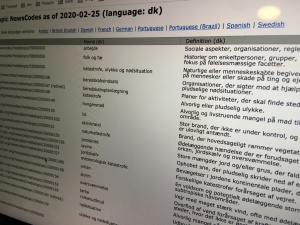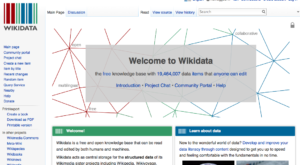Categories
Archives
 In late February we pushed the latest update to Media Topics, IPTC’s main controlled vocabulary for subject classification (also known as a taxonomy).
In late February we pushed the latest update to Media Topics, IPTC’s main controlled vocabulary for subject classification (also known as a taxonomy).
This release includes a translation of NewsCodes into the Danish language.
On behalf of the NewsCodes Working Group and its chair Jennifer Parruci, we would like to say thanks very much to Mette-Lene Østergaard and Mads Petersen from the Danish news agency Ritzau in Denmark for all their work on making the translation.
It’s available from all the usual places:
- The main IPTC Controlled Vocabulary server at cv.iptc.org, which includes both human- and machine-readable versions of all IPTC NewsCodes: http://cv.iptc.org/newscodes/mediatopic/
- HTML browsable view: https://www.iptc.org/std/NewsCodes/mediatopic/treeview/
- Graphical tree view: http://show.newscodes.org/index.html?newscodes=medtop&lang=dk&startTo=Show
- Downloadable Excel version: https://www.iptc.org/std/NewsCodes/IPTC-MediaTopic-NewsCodes.xlsx
The IPTC Media Topic NewsCodes vocabulary is now available in 9 languages: Arabic, British English, Danish, French, German, Portuguese, Brazilian Portuguese, Spanish and Swedish.
We are working with partners on several more language translations coming very soon. If you would like to work with us on contributing a new language translation of IPTC Media Topics or any other IPTC standard, please contact us!
 The NewsCodes Working Group of IPTC has completed mapping of the top two levels of hierarchical terms of Media Topics to Wikidata.
The NewsCodes Working Group of IPTC has completed mapping of the top two levels of hierarchical terms of Media Topics to Wikidata.
Media Topics is an IPTC standard – a 1,100-term taxonomy with a focus on categorizing text. Released in 2010 as a development based on the IPTC Subject Codes, use of Media Topics is free and available in different formats. They can be viewed on the IPTC Controlled Vocabulary server, or in a user-friendly tree hierarchy tool.
IPTC creates and maintains taxomonies and controlled vocabularies – to assign terms as metadata values to news objects like text, photographs, graphics, audio and video files and streams. This allows for a consistent coding of news metadata across news providers, over the course of time.
“The idea of semantic mapping and being involved in a linked data initiative like Wikidata is a natural step for IPTC,” said Jennifer Parrucci, chair of the IPTC NewsCodes Working Group and senior taxonomist for The New York Times. “When linking an existing taxonomy to another, Wikidata serves as a central point of reference.”
Wikidata is a free, collaborative, multilingual knowledge base that can be read and edited by both humans and machines. It provides centralized storage for an access to structured data for all Wikimedia projects, as well as for use on external websites.
In total about 100 mappings from Media Topics to Wikidata have been manually applied. The mappings use SKOS mapping relationships.
Media Topics began with the Subject Codes vocabulary and extended the tree from 3 to 5 levels and reused the same 17 top-level terms. The lower-level terms have been revised and rearranged. Each Media Topic provides a mapping back to one of the Subject Codes.
More information:
Media Topics Page, IPTC.org
IPTC Controlled Vocabulary server
Guidelines
Tree Hierarchy Tool
News CodesSubject Codes
Questions? Contact us.
IPTC has secured funding and the foundation for language and technical requirements for its EXTRA Project – a rules-based classification system, as reported at IPTC’s Summer Meeting 2016 by Stuart Myles, project lead and IPTC Chairman of the Board.
EXTRA is the EXTraction Rules Apparatus, a multilingual open-source platform for rules-based classification of news content. EXTRA will allow newsrooms to automatically annotate news content with high-quality metadata subjects using a predefined set of rules. IPTC was awarded a grant from the first round of Google’s Digital News Initiative Innovation Fund to build and freely distribute the initial version of EXTRA.
The EXTRA project team has delivered a road map for the project to Google’s Digital News Initiative, and are finalizing their plans for language requirements and rules, as well as technical requirements and licensing. IPTC will approach existing open source communities, linguists and programmers to facilitate development.
For easy adoption and consistency in the news industry, IPTC is creating rules for tagging documents with its industry standard Media Topics vocabulary, used widely by publishers. IPTC plans to provide example rules for at least two of the languages supported by Media Topics: Arabic, English, French, German and Spanish.
“For small to medium size publishers who are dissatisfied with hand-tagging their content or grappling with complex machine-learning tools, EXTRA is an open-source news classification engine that will let you easily apply rich metadata to breaking news content,” said Myles. “Unlike manual techniques, which can be slow and inconsistent, or traditional statistical methods, which aren’t suitable for breaking news, EXTRA’s rules-based classification will provide fast, consistent and relevant metadata to enrich search, advertising and content analytics.”
IPTC invites other parties to join the development of the EXTRA project. To get involved, contact Myles at chair@iptc.org.
Related Links:
For developers: http://dev.iptc.org/Topic-EXTRA
Road map and project description: https://iptc.github.io/extra/
Press Release
Categories
Archives
- November 2025
- October 2025
- September 2025
- August 2025
- July 2025
- June 2025
- May 2025
- April 2025
- March 2025
- February 2025
- January 2025
- December 2024
- November 2024
- October 2024
- September 2024
- August 2024
- July 2024
- June 2024
- May 2024
- April 2024
- March 2024
- February 2024
- December 2023
- November 2023
- October 2023
- September 2023
- August 2023
- July 2023
- June 2023
- May 2023
- March 2023
- February 2023
- January 2023
- December 2022
- November 2022
- October 2022
- September 2022
- August 2022
- July 2022
- June 2022
- May 2022
- April 2022
- March 2022
- February 2022
- January 2022
- December 2021
- November 2021
- October 2021
- September 2021
- August 2021
- July 2021
- June 2021
- May 2021
- April 2021
- February 2021
- December 2020
- November 2020
- October 2020
- September 2020
- August 2020
- July 2020
- June 2020
- May 2020
- April 2020
- March 2020
- February 2020
- December 2019
- November 2019
- October 2019
- September 2019
- July 2019
- June 2019
- May 2019
- April 2019
- February 2019
- November 2018
- October 2018
- September 2018
- August 2018
- July 2018
- June 2018
- May 2018
- April 2018
- March 2018
- January 2018
- November 2017
- October 2017
- September 2017
- August 2017
- June 2017
- May 2017
- April 2017
- December 2016
- November 2016
- October 2016
- September 2016
- August 2016
- July 2016
- June 2016
- May 2016
- April 2016
- February 2016
- January 2016
- December 2015
- November 2015
- October 2015
- September 2015
- June 2015
- April 2015
- March 2015
- February 2015
- November 2014